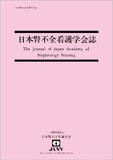Japanese
English
- 有料閲覧
- Abstract 文献概要
- 参考文献 Reference
血液透析導入から3か月後までの期間において,療養する患者とともに暮らす妻の体験を明らかにすることを目的とし,透析療法が導入された患者の妻4名に透析導入後1か月,2か月,3か月にナラティヴ・アプローチを用いたインタビューを行った.
4名の参加者の語りのテーマは,それぞれ「療養支援の気負いが和らいでいく」「元気になることへの期待と焦りに揺れる」「透析患者となった夫との関係を捉え直す」「不安定な夫の状態に合わせて一喜一憂する」であった.透析導入後3か月までの体験の語りは,夫の不安定な状態に対する戸惑いを表出し,夫婦関係を捉え直しながら,療養生活の支援に対する自分の思いに気づき,意味づけていくものであった.
妻たちは夫の透析導入に対する自責の念を抱き,この思いは夫の療養支援への気負いにつながっていた.透析導入後3か月の時期に,妻たちが看護師に思いを語る機会をもつことは,療養支援に対する気負いを緩めることにつながる.また,妻たちが夫との療養生活を語るなかで夫の理解を深め,夫婦の関係を捉え直すことは,透析を受けながら暮らす夫との生活を描き直すことにつながると考える.妻たちは,夫の透析導入について語ることを拒んでいるのではなく,自分の思いをわかってくれる人と語る機会を求めていた.
透析導入後3か月の時期に看護師が妻の語りを聴き,共に妻の体験の意味を見いだしていくことは,妻への支援として重要であることが示唆された.
This study aims to elucidate the experiences of wives living with husbands recuperating while receiving dialysis during their first three months of hemodialysis.
The design of this study is a qualitative descriptive study using the narrative approach. Participants were four wives of patients beginning dialysis therapy. The interviews were conducted at three points during the first three months of dialysis: one month after beginning dialysis, two months after beginning dialysis, and three months after beginning dialysis.
The narrative themes of the four participants were, respectively, “ease the pressure to provide recuperation support”, “waver between expectations and impatience toward my husband's recovery”, “re-examine my relationship with my husband, who is now a dialysis patient”, and “have mood swings according to my husband's unstable condition”. In their narratives of experiences during the first three months of dialysis, wives expressed confusion in accepting their husband's unstable condition, and their realization of their own feelings through re-examination of their relationship with their husband.
Wives felt remorse for the introduction of dialysis for their husband, and this feeling led to pressure to provide recuperation support for their husband. Opportunities for wives to tell their concerns to researchers and medical personnel at three months after introduction of dialysis were thought to help them ease the pressure to provide recuperation support. In addition, the deepening of the wives' understanding of their husband and the re-examining of their relationship with their husband through narratives of their recuperative lifestyle with their husband were thought to lead to the re-designing of their lives with their husband, who is receiving dialysis. Wives did not avoid talking about the introduction of dialysis for their husbands and sought opportunities to talk to individuals who could understand their feelings.
These findings suggest that the act of nurses listening to the wives' narratives and finding meaning in the wives' experiences together with the wives at three months after introduction of dialysis constitutes important support for wives.
Copyright © 2023, JAPAN ACADEMY OF NEPHROLOGY NURSING. All rights reserved.


